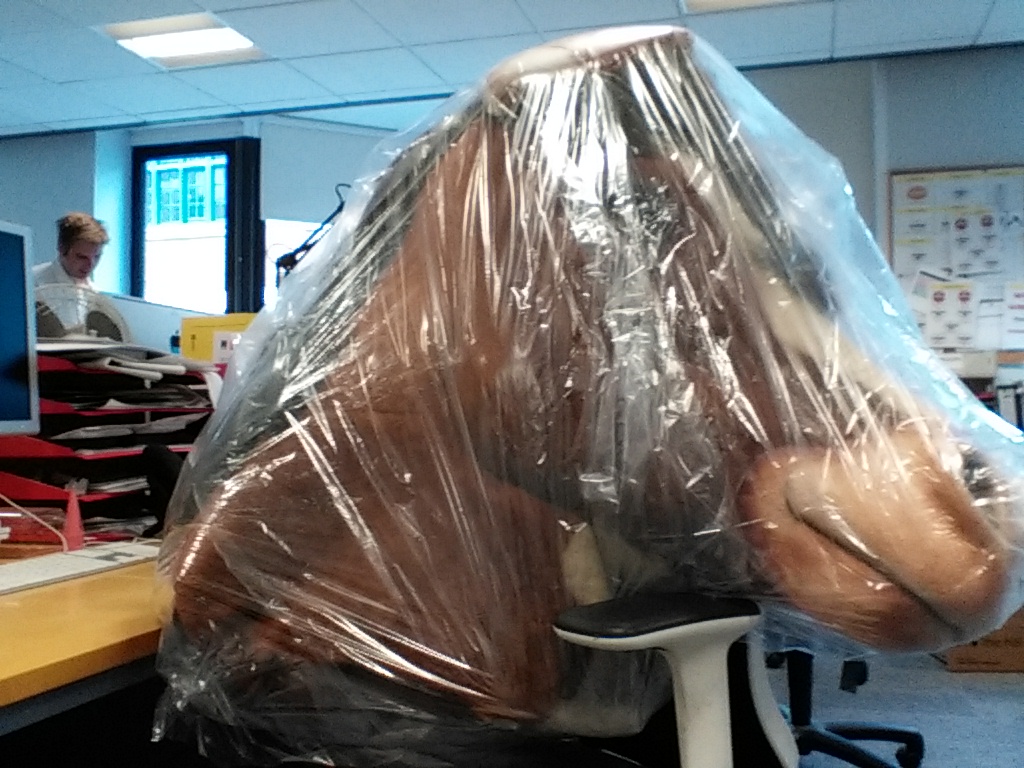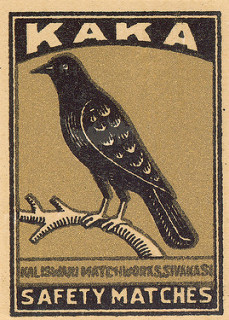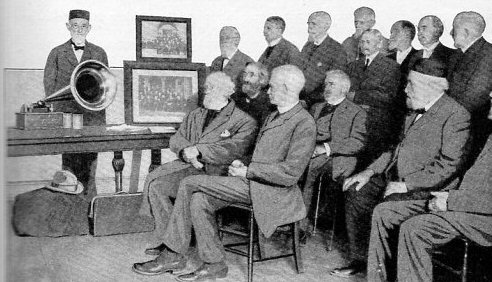In the hamlet of Glebe there is a blind brute, the village wrestler, a man with the mien of a squirrel, or perhaps of a distressed mole, and they coax him, this brute, with fronds, for he is fond of fronds, they coax him out of his cubby and drive him out of the hamlet and up into the hills, poking at him with their pitchforks and making awful guttural yelps to affright him, and when he is up in the hills, they scamper back, the villagers, and hold a picnic upon the green, munching their sausages and plums and swigging their cans of Squelcho!, singing roundelays and setting fire to ladybirds, they are oh! a vicious lot, each and every one, and the blind village wrestler dares not return until nightfall, from up in the hills, he senses the twinkling stars by sniffing and by running his fat fingers through the air, and when he is sure it is night he comes clumping down from the hills, pausing to slurp water from rills, and he enters the hamlet of Glebe in the darkness and crosses the green, and he stumbles upon the picnic remnants, discarded sausages and plums, the sausages of contaminated meat and the plums half-rotten and sour, and he gobbles them down his squirrely, moley gullet, and then, by touch, he gathers up the crumpled and empty Squelcho! cans and carries them to his cubby and falls into a dreamless snooze, from which he wakes, in the morning, when he hears the clink and clank of the milk cart, and the horrible “halloo!”s of the villagers, and he takes his hammer and beats flat the Squelcho! cans and adds the flattened tin to his store of flattened tin and he knows that soon, oh!, soon, perhaps in three or four picnics’ time, he will have enough tin to fashion for himself a suit of tin armour, fitting him from squirrely head to moley toes, and then he will no longer fear the poking of pitchforks, and he will come clattering out from his cubby and roar and bash and bash and bash and bash until each and every one of the horrible wankers of the hamlet of Glebe is lying sprawled upon the green, groaning for mercy, and it will be a fine day, and he will set them on fire, each and every one, just as they set on fire the ladybirds, at every damnable picnic, and then the blind brute village wrestler will cast off his Squelcho! can tin armour and he will stride up into the hills where, over many moons, he has built a shrine, and he will slump on to his knees before the shrine and pound his fists upon the earth and declaim, in awestruck tones, his eternal devotion to the Ladybird God.
Author Archives: Frank Key
Eye Eye (Again)
Last week I went for my first appointment at the Tuesday Injection Clinic (which I think of as the Tuesday Injection Club). I learned a number of things. One, that I would be attending every fortnight, rather than every month, until at least the end of the year. Two, that the entire procedure passes off efficiently and painlessly.
But the most important lesson I have learned is that I am now armed with a stupendously effective conversational gambit. Let us imagine, just for one wild moment, that one of these days I actually get invited to a swish sophisticated cocktail party where I can lean insouciantly against a mantelpiece. Now picture various other guests approaching me to engage in conversation with what they fondly imagine will be impressive anecdotes.
“Let me tell you about the time I met John F Kennedy”, would say my ex-employer Elkan Allan (were he not late and lamented). Or, “One of my blog posts was picked up by the Huffington Post”, would say my sister Rita Byrne Tull. Or it might be someone telling me they had climbed Everest, or swum the Channel, or discovered the Fab Four, or any number of thrilling facts.
And now imagine a moment of silence, while I pause and play that pause for all it’s worth, and I then say, “Well, that’s very interesting”, and then I declare, in resounding tones, “But every two weeks I have needles injected directly into my eyeballs!”
I can assure you that the effect is electrifying. I have already tried it out a few times – though sadly not in the context of a swish sophisticated cocktail party – and I can report that jaws drop, eyes boggle, and questions are fired at me. I, of course, retain an air of insouciant calm.
I tell you what, as medical issues go, this one certainly beats water-on-the-knee or mad cow disease when it comes to mopping the floor with rival anecdotists.
Irresponsible Shepherds
“The problem is not the sheep. The problem is irresponsible shepherds.” Thus spake – on the radio this morning – a spokesman for the majestically-named Irresponsible Shepherding Task Force in the Forest of Dean. Apparently, that rustic paradise is riddled with irresponsible shepherds who, among sundry enormities, allow their sheep to bleat in the middle of the night.
Personally, I am not surprised to learn about outbreaks of nocturnal bleating. Sheep are highly neurasthenic creatures who spend their entire lives in a state of fretfulness and nervous tension, and as a result they rarely sleep. This is probably one reason why, as has been observed by several country persons, a sheep’s ambition in life is to die.
The Remainder Of The Horse
Commenting on yesterday’s scene from the life of Pansy Cradledew, R. noted “Let us hope that tomorrow the remainder of the horse will appear, whereupon the enigma will be resolved”. Et voila!
Scenes From The Life Of Pansy Cradledew
Scenes From The Life Of Pansy Cradledew is our popular series in which, Boswell-like, we document exciting scenes from the life of Pansy Cradledew. Today, we turn our attention to Wednesday the third of August 2016.
Wednesday, 3 August 2016 [aetat. 51]. It so happened that on the morning of this day, Ms Cradledew found herself sitting next to the head of a horse enshrouded in cellophane. The horse-head remained in situ for the entire morning, though shortly after the clock struck noon it was removed, and taken away, she knew not where.
Lars Talc, Lars Talc
Lars Talc, Lars Talc, took a snifter, took a snifter, then he revved up his jalopy, his jalopy he revved. With his foot on the pedal he vroomed away, he vroomed away ’til he was out of sight. As soon as he was out of sight, he screeched to a halt and fell out of the jalopy and into a puddle.
That is where they found him, sitting in a puddle, his hat fallen and craneflies hovering around his now bare head. They found him, and they discussed exterminating the craneflies but could not think of a method of doing so without causing collateral harm to Lars Talc. And Lars Talc had to be protected at all costs, for, snifters or no, he was privy to secret details of the dustbin of history.
So they placed a cordon around the puddle, an electrified cordon, using electricity and cables and chickenwire. They stole the chickenwire, provoking the wrath of a nearby poultryman. Now Lars Talc and this particular poultryman had never seen eye to eye. They had Biblical differences, also Talmudic ones. Yet physically, they could not have been more similar. They might have been identical twins.
They were identical twins! They had been separated, Lars Talc and the poultryman, at the age of ten when, orphaned, the one had been sent to a Schloss and the other apprenticed to a big bellicose brutish British butcher famed for his cocktail sausages. There were no sausages at the Schloss. It was a spartan Schloss run on vegan lines by a vegan Schlosser of great untidiness. The boot, now, was on the other foot.
There may be several sentences missing from the foregoing, sentences which might make more sense of it, even if you are paying only haphazard attention, distracted, as you are, by a march past of Corbynistas with placards, spitting and shouting, sockless, dreary, spitting and shouting, marching, marching, past Lars Talc and his craneflies in their cordoned-off puddle, on a Wednesday afternoon at the height of summer, far from the Schloss, and farther still from Lars Talc’s nest, now populated by birds, a nest in a tree in a forest.
When we are done here, we shall drive to the forest in a Japanese car.
“The Max Ernst Of Silly”
I have just discovered this rave review of Hooting Yard by Madeleine Swann – what an excellent surname! – who is a British “bizarro, horror, surreal, and weird fiction writer”. I do not know if she writes about swans, but I hope she does. Anyway, she has nothing but kind words to say about Mr Key and his prose, and she includes some links to stories featured on the Drabblecast. They include Norm Sherman;s matchless reading of “Far, Far Away”, which Ms Swann describes as “[not] so much science fiction as a bowl of madness”. If you have not heard Norm intone the words “magnetic mute blind love monkeys”, then do so right now. You will not regret it. And many thanks to Ms Swann.
Kaka
Back in 2007, and then again in 2010, I wrote about Kaka. Although I did not mention it specifically, I was at the time under the impression that Kaka was a foopballer. I have now learned that Kaka is, in fact, a bird. This sheds an entirely new light on things, and I fear I must go back to the drawing-board.
Homework
Read and digest the piece Collapsed Puffin, below. Then reread it and redigest it. If necessary, rereread it and reredigest it. Now, using a sharpened pencil and a sheet of foolscap paper, write a variation of the piece from the point of view of the companion, Squiffy. You should aim to address the following matters:
1. Why do you think the narrator keeps nagging Squiffy regarding his goggles, ear-corks, nasal icicles, and furry boots?
2. Which of the pair do you think is the pilot of the chopper?
3. Does the collapsed puffin actually exist or is it an hallucination borne of cold, exhaustion, or even piblokto?
4. Do you think the narrator’s love of puffins, guillemots, auks, and bonxies is sincere and unreserved, or is it an affectation?
5. Can you recall any nursery rhymes in which bonxies appear?
When you have finished, turn over the piece of foolscap paper and, on the reverse, write an even more compelling variation from the point of view of the collapsed puffin.
Collapsed Puffin
Oh look, a puffin has collapsed on that floe.
Wipe the steam from your goggles and you will see it too.
We should airlift it to the puffin hospital yonder in our chopper.
Take those corks out of your ears so you can hear me speak.
Love is a mighty power, and I love puffins, as I love guillemots and auks and bonxies.
Snap those icicles dangling from your nose and you will breathe easier.
Here comes a blizzard. Oh, puffin, don’t die.
Stamp your feet in your furry boots, my companion.
Two men and a collapsed puffin in a white wasteland.
Allegory of something or other.
The chopper blades are frozen, and we are stranded, or marooned.
Come, Squiffy, plod with me towards the puffin, that we may give it succour.
Love conquers all, if you will wipe those damned goggles!
Eye Eye
I ought to explain why things have been so quiet at Hooting Yard of late. I am beset by a case of diabetic retinopathy – plus a Roth spot – and my eyesight is, quite frankly, pitiable. Typing and peering at a computer screen are rendered somewhat laborious, and the effort required often results in general exhaustion and debility. Hence the lack of sweeping paragraphs of majestic etc etc.
But all is not lost! I shall shortly be commencing a series of monthly appointments at the exciting-sounding Tuesday Injection Clinic in the ophthalmic department of my local hospital. The Key eyes will be jabbed with needles each month until such time as my sight returns to normal – normal, for me of course, meaning myopic, akin to a mole, but much better than it is now.
In the meantime I will try to post here when able, and I look forward to resuming normal service before too long.
Press Clipping
From the “What are you reading?” column in this week’s Times Higher Education:
Tony Mann, director of the Maths Centre, University of Greenwich, is reading Frank Key’s Mr Key’s Shorter Potted Brief, Brief Lives (Constable, 2015) and By Aerostat to Hooting Yard: A Frank Key Reader (Dabbler, 2014, Kindle edition). “Thanks to a reading at the excellent Greenwich Book Festival I have discovered the work of Frank Key, whose humour is reminiscent of both Wodehouse and Beckett. His stories of his imagined world, with evocative place-names and regularly recurring characters like the out-of-print pamphleteer Dobson and the ‘fictional athlete’ Bobnit Tivol, are unsettling, vaguely sinister and very funny.”
Clearly a very sensible Mann.
The Big Metal Pod
Foopball News
I must say that thus far the Euro2016 foopball tournament has proved somewhat disappointing. No commentator has yet matched the majestic observation, at the 2010 World Cup, “for a moment there, he looked like a baby gazelle who’d just plopped out of the womb”. But perhaps things are looking up. Today I have learned that the Italian defenders “are like tawny owls”.
Broke, Pompous, And High As A Kite
In a review of a new biography of Thomas De Quincey, Hermione Eyre brilliantly describes him as “broke, pompous, and high as a kite”. Could the same, I wondered, be said of Mr Key? Let us take them in turn.
Broke. Definitely. I have a very limited income, and I lead a very frugal life. I am deeply grateful to my subscribers and those who make one-off donations (you know who you are) who help to alleviate my penury. I did entertain the fantasy, last year, that Mr Key’s Shorter Potted Brief, Brief Lives might become a huge international bestseller and thereby bring the wealth of Croesus showering upon me, but of course this failed to happen. Writing is not a sensible pursuit if one wants to become rich.
Pompous. I try my best to burnish my pomposity. Declaiming and pontificating, particularly upon subjects I know little or nothing about, is a helpful approach in this regard. It is also important not to behave, or even think, as if one is broke (see above). In fact, reduced circumstances can make pomposity easier to achieve. Having little justification to assume an air of grandeur, my attitude of rising high above the riffraff is most surely pompous, and I would have it no other way.
High as a kite. This is where I am unable to compare myself to De Quincey. In the last century, I could have done. An American editor, considering my early work, wondered if I wrote under the influence of hallucinogenic drugs. (This is referred to in David Langford’s 1993 article, here.) While I eschewed illegal drugs, I was pretty much perpetually drunk for the last twenty years of the twentieth century, so I suppose it is true that all my early writing was done when I was high as a kite, or pissed as a newt. Eventually, of course, my debauches left me unable to string a coherent sentence together, and I was reduced to bestial grunting on the way to and from the off licence.
I swore off booze in 2001 and haven’t touched a drop since then. At first I did worry that perhaps clear-headed sobriety would scupper my prose, but of course it didn’t. Every so often I toy with the idea of writing one of those booze-memoirs, but the thing about drunks and druggies is that we are very, very boring. Unless, like Thomas De Quincey, we are touched by genius.



